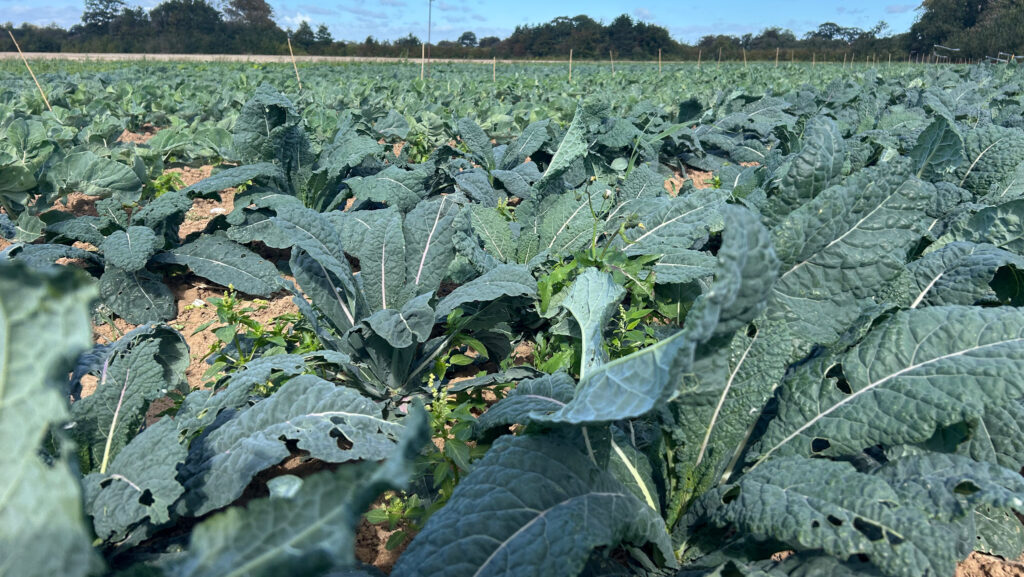Why vegetables are making a return to Kent arable farm
 Vegetables at Quex Park © MAG/Lois King
Vegetables at Quex Park © MAG/Lois King After more than 20 years, vegetable production is making a comeback at Quex Park in Kent – this time with a focus on sustainability, local markets and community engagement.
Following a large estate diversification, the farm is giving horticulture another go alongside its established arable business, with the help of new vegetable manager Jack Scott.
For the first year, he will take over a 6ha plot of high-grade productive arable land on brickearth soil.
See also: Advice on future-proofing arable farms as margins tighten
Farm facts
- 1,150ha arable farm
- Grade 1 and 2 soils
- Cropping includes wheat, oats, beans and 6ha of vegetable crops
- Located in Thanet, north-east Kent
“We will start with 6ha and see how the market responds. We have the land to scale up if demand grows,” says Jack.
In the early 2000s, Quex Park was one of the largest cauliflower and cabbage producers in Kent, supplying supermarkets across the region.
However, excessive losses forced the estate to move completely away from horticulture and into arable farming.
Local markets
The estate isn’t aiming for the supermarket shelves this time round, and instead will focus on local markets.
“We have eight outlets on the estate and a footfall of around 300,000 people annually. We also are in an area with about 2,000 potential local customers,” says Jack.
Possible suitable outlets on the estate include a café, farm shop, garden centre and restaurant.
The produce will trade under “Quex Park Vegetables”, utilising the estate’s well-established name. Jack is also hoping local food businesses will buy the vegetables.
“In the future, I’d like to get to the stage where we could offer Sunday roast boxes to local residents, using our veg and other local farmers’ meat,” says Jack.
To set themselves apart from more established growers in the area, the farm is aligning its vegetable enterprise with the Nature Friendly Farming Network.
What is the Nature Friendly Farming Network?
The Nature Friendly Farming Network is a farmer-led membership network that works with organisations and the public to promote sustainable farming in the UK.
They support farmers transitioning to nature-friendly practices that protect biodiversity, tackle climate change and safeguard the future of UK agriculture by producing plentiful food.
The strategy includes enhancing field margins and adopting a no-pesticide approach, and Jack believes they will go beyond the minimum requirements.
The farm’s programme will involve a combination of strategies – instead of herbicides, they will be reliant on mechanical hoeing, long rotations and tolerating some weed pressure.
In-field pollinator strips will be used to attract beneficial insects, along with companion planting, natural remedies, wider crop spacing and long rotations to disrupt pest cycles.
For fungicides, wider spacing will encourage air flow and natural products will be used where possible.
Jack believes steadily improving soil health makes plants become stronger and more resilient, reducing pest and disease pressure over time.
Although a conventional tillage system is still in use, with cover crops grazed and then ploughed in to create a seed-bed for vegetables, the estate is enriching soils with organic matter including compost, cattle muck and seaweed.
Rotation
The vegetables will be grown in a four-year rotation, along with winter wheat, spring oats and winter or spring beans, with catch and cover cropping.
“Brassica-free mixes will be used to avoid disease build-up. We are also going to trial undersowing some veg to build soil nitrogen levels and organic facility.”
With crops such as squash and brassicas, the farm plans to undersow with a low-growing clover to keep soils covered over winter and allow grazing once the crop is finished, providing organic N for the following crop. This will all help build long-term fertility.
Irrigation will come from a substantial borehole-supported reservoir, with drip tape for crops such as courgettes and cucumbers, while sprinklers will be used on field scale crops.
Jack would like to encourage the younger generation into the business by offering apprenticeships. He plans to train the individuals, help them gain a qualification and offer them a full-time job at the end of the contract.
Jack aims to get more out of this project than just growing vegetables, he wants to grow a future for farming and encourage consumers to shop local.
